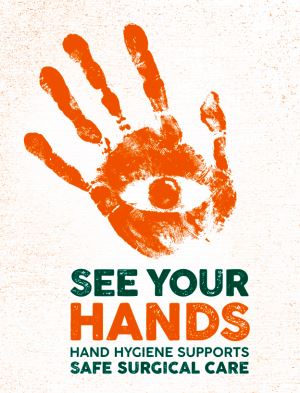 3 May 2016 | Cairo – On the occasion of World Hand Hygiene Day, celebrated every year on 5 May, WHO urges health care workers to improve patient safety through following proper hand hygiene practices to reduce the number of health care-associated infections. The subject of this year’s campaign is surgical site infections, with particular focus on ensuring clean hands from the moment the patient enters the hospital, through surgical preparation and post-operative care, until the patient is discharged.
3 May 2016 | Cairo – On the occasion of World Hand Hygiene Day, celebrated every year on 5 May, WHO urges health care workers to improve patient safety through following proper hand hygiene practices to reduce the number of health care-associated infections. The subject of this year’s campaign is surgical site infections, with particular focus on ensuring clean hands from the moment the patient enters the hospital, through surgical preparation and post-operative care, until the patient is discharged.
Health care-associated infections often occur when germs are transferred by health workers’ hands. Surgical site infections are the most frequent type of infection in low-income and middle-income countries, with a pooled incidence of 11.8% of surgical procedures. They can be prevented by health workers following standard hand hygiene practices. Adequate hand hygiene in surgical sites can reduce the prevalence of health care-associated infections. 8 million lives can be saved worldwide every year in hospitals alone by halting surgical site infections and other health care-associated infections.
In the Eastern Mediterranean Region, the prevalence of health care associated infections in several countries is reported to vary from 12% to 18%. “These infections cause avoidable suffering for patients, prolong hospital stays, increase financial burden and, sometimes, lead to long-term disability or death,” said Dr Ala Alwan, WHO Regional Director for the Eastern Mediterranean.
WHO calls on all health care facilities to join the “SAVE LIVES: Clean Your Hands” movement and commit to improving hand hygiene practices. “In the Eastern Mediterranean Region, 1480 health care facilities in the 22 countries have registered for the SAVE LIVES: Clean Your Hands campaign. This number demonstrates the ongoing efforts to promote safer care. Nevertheless, it needs to be substantially increased during 2016,” Dr Alwan added.
Surgical care workers can help to prevent surgical site infections through following standard hand hygiene practices when interacting with patients, inserting an intravenous or urinary catheter, giving medications and caring for a post-operative wound.
Although hand hygiene is a very simple action, it is also the primary action in preventing health care-associated infections and enhancing patient safety. Yet, several studies around the world have shown that only around 40% of the health care workers follow the standard hand hygiene practices.
“A significant number of health care facilities in some countries still do not have soap and water for hand hygiene, highlighting the importance of the water, sanitation and hygiene agenda for hand hygiene compliance and the provision of safe care,” Dr Alwan notes.
Related links
Practise hand hygiene for surgical patients from admission to discharge
Videos
Posters

English | Arabic | French
For more information:
Dr Mondher Letaief
WHO Regional Office
mobile: +201028011579
This e-mail address is being protected from spambots. You need JavaScript enabled to view it
Mona Yassin
WHO Regional Office
mobile: +201006019284
This e-mail address is being protected from spambots. You need JavaScript enabled to view it





